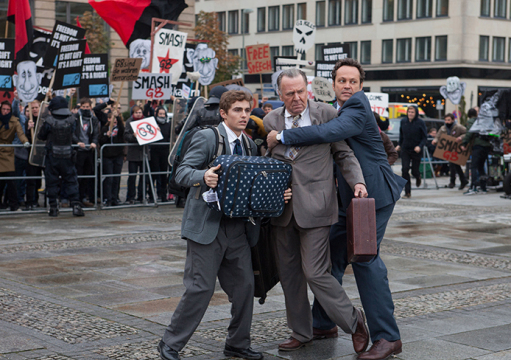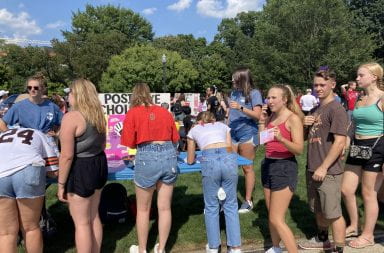
A hard-working small business owner Dan Truckman (Vince Vaughn, right) and his two associates Timothy McWinters (Tom Wilkinson, center) and Mike Pancake (David Franco, left) in the comedy ‘Unfinished Business.’
Credit: Courtesy of TNS
Vince Vaughn has made a name (as well as many paychecks) for himself in his comedy work. He’s starred in high concept movies like “Dodgeball: A True Underdog Story” and “Wedding Crashers,” although he also made a mark in the ‘90s through dramatic roles as in thrillers like “Psycho” and “Return to Paradise.”
Now this year, he’s returning to that genre when he stars in the second season of HBO’s “True Detective,” which had among the highest critical acclaim in 2014 television. He also returns to movies Friday with “Unfinished Business,” which, like “Dodgeball,” has him in a average Joe role in a buddy comedy that also stars Dave Franco, Nick Frost and Tom Wilkinson. It was directed by Ken Scott, who’s worked almost exclusively in French language films. With a Rotten Tomatoes score of 6 percent, it also puts him in a polarized reception with critics this year. Amid that position, he talked to college media about the roles he chooses, the current state of comedy and his upcoming role in the HBO drama.
College media: “Unfinished Business” is an original script like many of your other films. How do you feel about the increasing dominance of remakes and sequels in Hollywood versus these original films and what would your dream remake be?
Vince Vaughn: Well, I’ve been a part of both. I like being a part of an original idea, there’s something that’s exciting about it. I do understand when someone is moved by something or excited by something and they almost want to homage it or they have an interpretation of it. It feels like nowadays, in the market place, there is a sense that you have to have a big IP or franchise in order to cut through in the movie theaters. The fault of that is that a lot of the character stuff or people driven stories go to the wayside.
When I started, we had “Swingers” and those kind of movies, and you would start on a smaller screen release, and that has continued, but the fear is that you lose more of that. That being said, there are some funny movies and some very good small character movies that break through. There is room for all of it, but personally I like original character-based stories more so than the other.
The Lantern: Were there any times you and Ken were on set and had issues with the comedy being lost in translation?
VV: He comes from an improv background, he comes from comedy. He’s a passionate person, he’s very interested in human beings. I think when you are dealing with language barriers, yes, things can get lost in translation, but I think those things would make us laugh rather than drive us apart.
College media: “Swingers” was considered one of your breakout roles by a lot of people. Would you say that is what your early days were like when you moved from high school straight to Los Angeles?
VV: Yeah, I lived in that neighborhood and a lot of the ex-punk rock bands started playing live swinging music which was really cool. There are definitely aspects that are drawn on that are based on mine and Jon (Favreau)’s experience. It’s a comedy so it is exaggerated for the narrative, but it pulled on elements of it. I wouldn’t say it is a biography by any means, but we pulled elements of the world we knew to tell the story.
College media: You have a lot of comedy films under your belt. What makes “Unfinished Business” different from those, and what attracted you to the roll of a small businessman?
VV: I started doing a lot of art comedies, which means you are being appropriate with adult movie with adult language and situations. Recently, I found myself in some more PG-13 movies. What I like about this was that they were going to deal with this with adult tone, language and situation. For me, the concept of guys going on a business trip, the dynamic of the family is relatable and the interplay of the guys seemed exciting. I liked Steve Conrad’s writing and I liked the tone they were portraying.
College media: You are now on the second season of “True Detective.” What was it like not only acting in a different genre, but also a TV series instead of movies?
VV: What’s interesting is when I came off of “Swingers,” I did a lot of independent films. I was reluctant to do studio films when I was younger so I did mainly dramatic movies. Then the director wanted me for “Old School,” but the studio didn’t want me to because they didn’t feel like I could do comedies. Once I did “Old School,” I went on a longer run of doing mainly comedies. For me, I’m kind of returning on some level to dramas, which was the first thing I broke out with. Now that I’ve done comedies, people feel like that’s a switch. I feel really excited to get on a different tone. Nick is incredible, the story is phenomenal. I think things are really changing because of young people, in a good way. The dramatic roles is really eight episodes and the end, it’s a beginning, middle and an end. It’s not an ongoing series where they try to keep coming up with stuff to keep the ball rolling. They really develop the story that takes that length of time to tell. You can go longer and further and more complicated when you have that kind of time to tell it. The structure of a movie is much more limited — content is keen, the quality is keen.
College media: What did it take mentally to take on two separate projects?
VV: It’s fun to mix it up and do different stuff. These pieces have different tones. A comedy, you need to be lighter, you have to be committed. With a drama, it’s more allowing for you to go to a wider range of emotions, which calls for different levels of emotional connection. “Dying is easy, comedy is hard” — in a drama, you have to be truthful and present and have to experience the moment. Comedy, you have to do that, but you have to make people laugh. With comedy, you either make people laugh or you don’t. Dramas are less intimidating than approaching a comedy.
TL: Are you nervous to take on the “True Detective” role because it will be under such a microscope?
VV: The writer, Nic (Pizzolatto), is very talented. I look at it as his second album, and I am just a part of it. If you have good material and a good storyteller, it’s exciting, its fun. I’m dealing with the process of following his lead and the rest will fall into place.
College media: What kind of trend are you seeing in comedy?
VV: A lot of times if something is successful, the instinct is to copy or repeat it right away. I haven’t done a sequel to any of my comedies because I’ve always felt you need to have a really good idea that stands alone in order to put that story out, versus following up the next year with another version of that movie, and let the fact that the movie did well be more important than having a good concept for it. I think there is a trend to jump on something and make a sequel right away before there is an original idea to suit the characters well.


